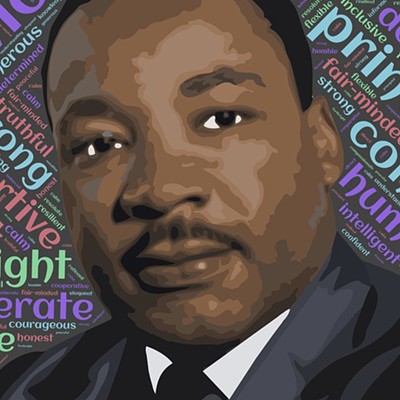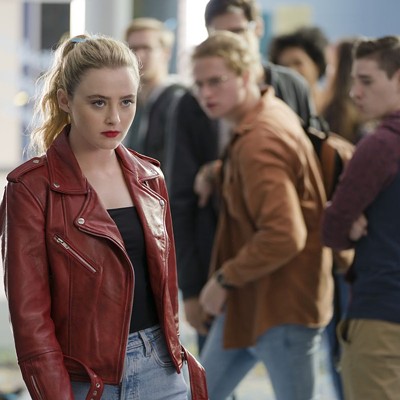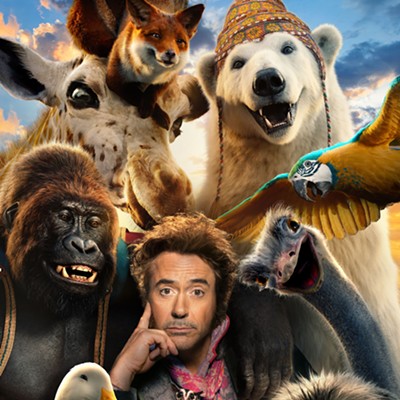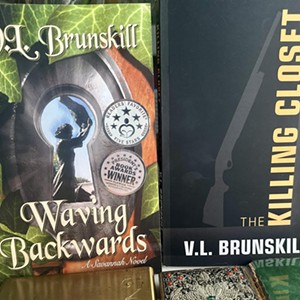CARS: Admit it: Ever since Pixar Animation Studios began its incredible run with Toy Story back in 1995 (followed by five more toon blockbusters, the last being The Incredibles), haven’t most observers been wondering when the company will hit a critical and/or commercial roadblock and watch its latest effort crash and burn? Newsflash: It’s hasn’t happened yet, and it ain’t happening with Cars. John Lasseter, the creative wizard behind Pixar (and now Walt Disney Pictures as well) has repeatedly stated that the key to any good animated film is the story, and of course he’s absolutely right. But the success of Pixar rests with the fact that they go beyond good storytelling and beyond good visual schemes to provide their pictures with that extra oomph, whether it’s in the tiny details or in the always spot-on voice casting. For all its high-gloss NASCAR trappings, Cars is ultimately a paean to Route 66. The cars are the characters -- no humans exist in this world -- and the most prominent vehicle is Lightning McQueen (voiced by Owen Wilson), a rookie sensation on the NASCAR circuit (the name is doubtless an homage to Steve McQueen, a real-life racing enthusiast). Lightning is cocky, conceited and convinced that he needs nobody’s help to make it to the top. Clearly, Lightning is due for a comeuppance even more than he’s due for an oil and filter change. On his way to California to prepare for a race against a grizzled veteran known as The King (Richard Petty) and a loudmouth called Chick Hicks (Michael Keaton), Lightning unexpectedly winds up in the town of Radiator Springs, a once-bustling Route 66 burg whose status rapidly collapsed once the freeway insured that all cross-country traffic would be diverted away from the town. He becomes acquainted with the locals, including Sally (Bonnie Hunt), a former big-city lawyer who prefers the simple life; Mater (Larry the Cable Guy), a good ole boy tow truck whose idea of a good time is tipping the sleeping tractors; and Doc Hudson (Paul Newman), a sage automobile who might be able to teach the young hothead a few things about winning -- not only on the track but also in life and in love. That Lightning will find redemption is never in doubt, but like the best storytellers, Lasseter and his co-writers make the journey to self-discovery as interesting as possible.
PRAIRIE HOME COMPANION Robert Altman’s best film since the one-two punch of Short Cuts and The Player back in the early 1990s might at first glance seem like a minor work, an ambling, congenial picture constructed as little more than an opportunity to corral several major talents and give them a chance to sing songs and tell jokes in a relaxed setting. That the film is inspired by Garrison Keillor’s long-running radio show of the same name adds to that impression: Keillor, at least in his on-air persona, is the epitome of laid-back, down-home hospitality. Altman’s Prairie can indeed be viewed in such a light, but there’s more going on here. For all its levity, the central theme focuses on the specter of Death -- how it hovers around us, how it haunts us, and how it can inform our every move. The movie chronicles the events that take place during the last broadcast of a popular radio show. The Axeman (Tommy Lee Jones), a corporate suit with no respect for history or tradition, has dropped by to make sure the closing goes according to plan. G.K. (Keillor), the program’s guiding light, takes it all in stride (“Every show is your last show; that’s my philosophy”), more concerned that all the talent is in place. And what talent! First, there are the singing sisters Yolanda and Rhonda Johnson (Meryl Streep and Lily Tomlin). Then there are the cowboys Dusty (Woody Harrelson) and Lefty (John C. Reilly), adept at crooning cowpoke tunes. Backstage, the characters are no less colorful. Guy Noir (Kevin Kline) handles security for the program, though his bumbling manner recalls Inspector Clouseau more than it does Sam Spade. Yolanda’s daughter Lola (Lindsay Lohan) mopes around in the dressing room while Mom performs. And then there’s the mysterious lady (Virginia Madsen) who appears out of nowhere and hangs around for the rest of the show. When the radio performers are front and center, the movie is nothing less than a joyous celebration of both Americana and the arts. Streep (who sang to equally good effect in Postcards from the Edge) and Tomlin make a formidable duet, while Harrelson and Reilly break through any lingering melancholy with their steady stream of quips.

























